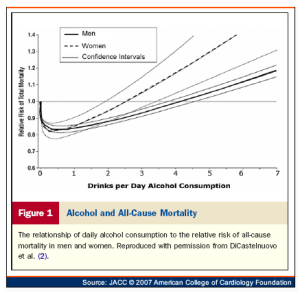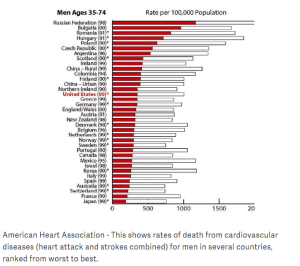Hello readers! I am currently on my maternity leave spending some quality time (and little sleep) with my brand new son! Enjoy this guest post from today’s featured author!
The following is a guest post by Richard Norton.
About Richard: Originally qualifying as a pharmacist in both the UK and Canada, Richard Norton has worked in the pharmaceutical industry for the last 25 years and has a passion for wine and its impact on health. He is founder and editor of FermentedGrape.com, dedicated to discovering, demystifying and debunking wine. As well as being one of the world’s leading wine & health bloggers, Richard also has a big interest in organic and biodynamic wine making.
This column is reproduced with permission. For more on FermentedGrape.com please visit their website here. www.fermentedgrape.com
The impact of alcohol and particularly wine has been a controversial subject for decades and no more so than in recent weeks following the new alcohol guidelines published by the U.K.’s Chief Medical Officer (CMO) Dame Sally Davies. In common with revised guidelines from Australia and Canada the advice was to cut down on drinking.
Bodies like the the World Cancer Research Fund (WCRF) and the American Institute for Cancer Research (AICR) have keen to talk up the links between certain cancers e.g. breast and alcohol consumption. The risk of breast, throat, gullet and other cancer is raised in alcohol drinkers. Yet kidney and prostate cancer risk seems to be reduced, the relative risk is much smaller than say the impact of smoking on lung cancer (2300% increase risk) and the picture from many clinical studies is conflicting or “heterogenous” in many cases.
Davies and her expert committee has recommended that he number of units that UK citizens are recommended to drink is cut

Photo courtesy Pixabay
from 21 to 14 units for Men and remained at 14 units for women (2 units is equivalent to a large glass of wine). The recommendation for both sexes to drink the same amount is surprising given the significant differences in Blood Alcohol Concentrations (BAC) between the sexes as a result of differences in Body Mass Index, radio of water to fat and levels of the enzyme Alcohol dehydrogenase. Still it seems the UK committee wanted to keep things simple at all costs!
Davies’ report claimed that “Evidence for a net protective effect of alcohol from risk of death (which has been linked to possible reduced risks of heart disease late in life) is considered less strong than it was. A reduced risk still exists, but, in the UK, it now appears to matter overall in a significant way only for women aged 55 or older.13 The 1995 report for the current guidelines found this protective effect applied at that time to men over 40 and postmenopausal women. This change in understanding is consistent with changes in the profile of heart disease in the UK and a changing population.“.
A controversial analysis by a group of academics based at Sheffield University managed to dismiss years of very strong clinical research that moderate consumption of alcohol has a positive impact on cardiovascular disease, stroke risk and mortality with a particular focus on a paper published in the BMJ in 2015, “All cause mortality and the case for age specific alcohol consumption guidelines: pooled analyses of up to 10 population based cohorts”. They concluded that “Beneficial associations between low intensity alcohol consumption and all cause mortality may in part be attributable to inappropriate selection of a referent group and weak adjustment for confounders. Compared with never drinkers, age stratified analyses suggest that beneficial dose-response relations between alcohol consumption and all cause mortality may be largely specific to women drinkers aged 65 years or more, with little to no protection present in other age-sex groups. These protective associations may, however, be explained by the effect of selection biases across age-sex strata.” However critics of this study have pointed out that because the authors gathered data which clearly showed health benefits from moderate drinking and then divided it into so many subgroups that it was almost impossible for them to produce statistically significant results. In the end the only people who appeared to benefit from drinking were post-menopausal women.
The negative analyses fly in the face of one of the most compelling pieces of evidence for the benefits of alcohol published in 2006 by Di Castelnuovo et al. They used a meta analysis technique where the results of 34 studies were reviewed The study looked at the link between the amount of alcohol drunk and death rates in men & women in clinical trials conducted before the end of 2005 with over 1 million subjects.
A J-shaped relationship between alcohol and total mortality was  confirmed in both men and women. Consumption of alcohol, up to 4 drinks per day in men and 2 drinks per day in women, was inversely associated with total mortality or the chance of dying, maximum protection being 18% in women and 17% in men. Higher consumption of alcohol was detrimental. The results were consistent with studies by other research including Sir Richard Doll, who was famous for proving the link between tobacco and lung cancer.
confirmed in both men and women. Consumption of alcohol, up to 4 drinks per day in men and 2 drinks per day in women, was inversely associated with total mortality or the chance of dying, maximum protection being 18% in women and 17% in men. Higher consumption of alcohol was detrimental. The results were consistent with studies by other research including Sir Richard Doll, who was famous for proving the link between tobacco and lung cancer.
In addition to clinical research there is the “The French Paradox”, a term first used by Serge Renaud, a scientist from Bordeaux University in France, and has been in use since the early 1990s. Renaud pointed out France presented a markedly lower annual mortality from CAD (coronary artery disease) compared with other industrialised nations, despite the fact that cardiovascular risk factors such as cigarette smoking, blood pressure, body mass index and serum cholesterol concentration were similar among these countries.
Renaud’s observations regarding the apparent disconnect between French patterns of high saturated fat consumption and  their low rates of cardiovascular disease can be quantified using data from the Food and Agriculture Organisation of the United Nations. In 2002, the average French person consumed 108 grams per day of fat from animal sources, while the average American consumed only 72 grams. The French eat four times as much butter, 60 percent more cheese and nearly three times as much pork. Although the French consume only slightly more total fat (171 g/d vs 157 g/d), they consume much more saturated fat because Americans consume a much larger proportion of fat in the form of vegetable oil, with most of that being soybean oil. However, according to data from the British Heart Foundation, in 1999, rates of death from coronary heart disease among males aged 35–74 years were 115 per 100,000 people in the U.S. but only 83 per 100,000 in France.
their low rates of cardiovascular disease can be quantified using data from the Food and Agriculture Organisation of the United Nations. In 2002, the average French person consumed 108 grams per day of fat from animal sources, while the average American consumed only 72 grams. The French eat four times as much butter, 60 percent more cheese and nearly three times as much pork. Although the French consume only slightly more total fat (171 g/d vs 157 g/d), they consume much more saturated fat because Americans consume a much larger proportion of fat in the form of vegetable oil, with most of that being soybean oil. However, according to data from the British Heart Foundation, in 1999, rates of death from coronary heart disease among males aged 35–74 years were 115 per 100,000 people in the U.S. but only 83 per 100,000 in France.
One of the causes of the “French Paradox” has been the observation that the French have a high per capita consumption and appreciation of wine in France, particularly red table wine — Resveratrol, Procyanidins and polyphenols.
Many other researchers have concluded that alcoholic drinks and particularly wine in moderation have a beneficial impact on health. Arranz et al said that “Wine consumption should not replace a healthy lifestyle. However, light-to-moderate wine drinkers, without medical complications, may be assured that their wine consumption is a healthy habit.” Cordova AC 2009 in “Polyphenols are medicine: Is it time to prescribe red wine for our patients?” states that “The habit of having one or two drinks of red wine every day with meals may translate to a longer, healthier and better quality of life.”
So in summary, the constant pressure from health bodies to dismiss the positive effect of moderate alcohol and particularly red wine is a blatant attempt to oversimplify the public health message that alcohol is bad for you in any quantity. But based on science this message is plain wrong, moderate alcohol drinking has a solid base of evidence that it will increase not decrease your life span.

2 comments for “Is Wine Really Healthy For You? The Controversy Continues!: A Guest Post by Richard Norton”